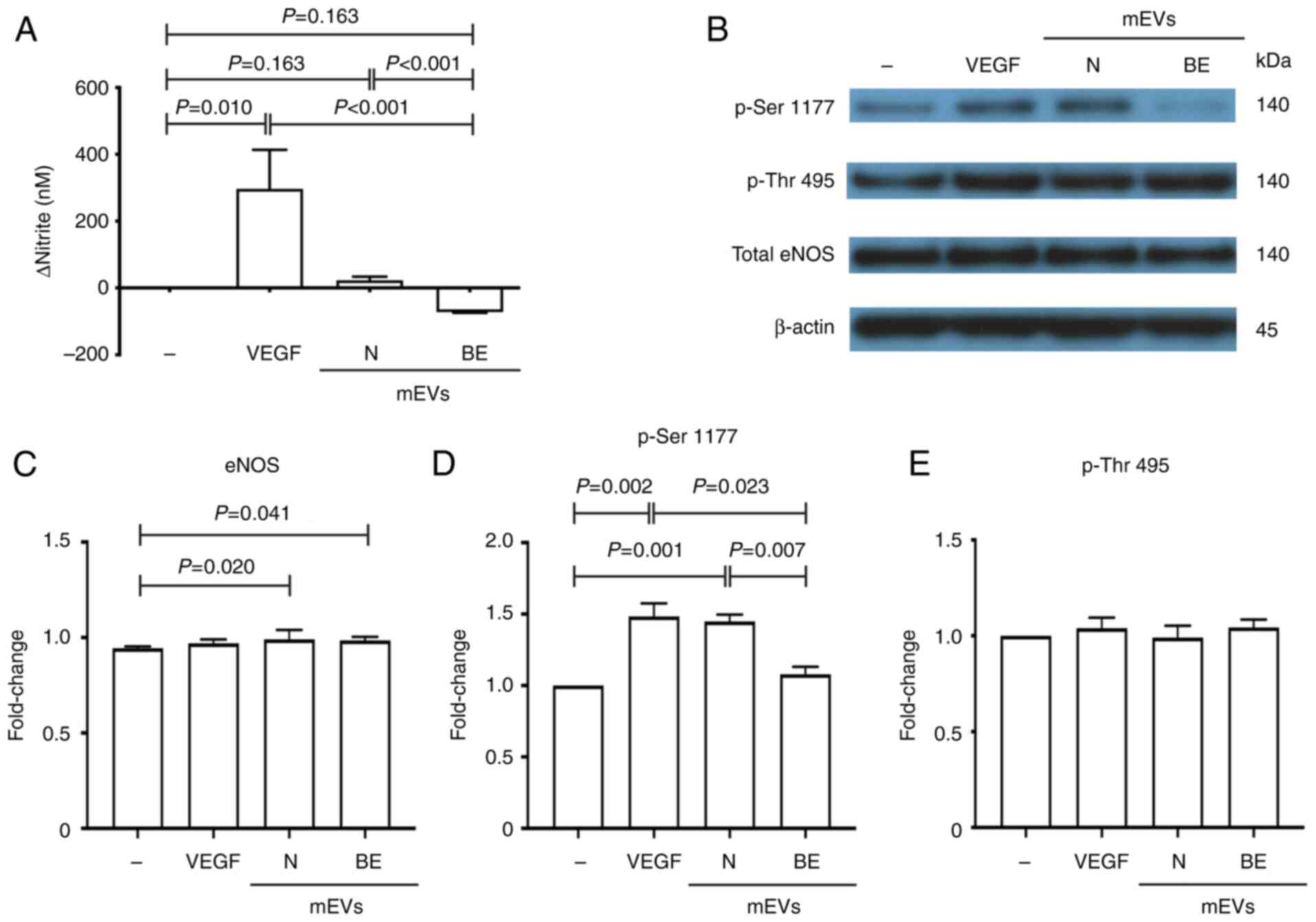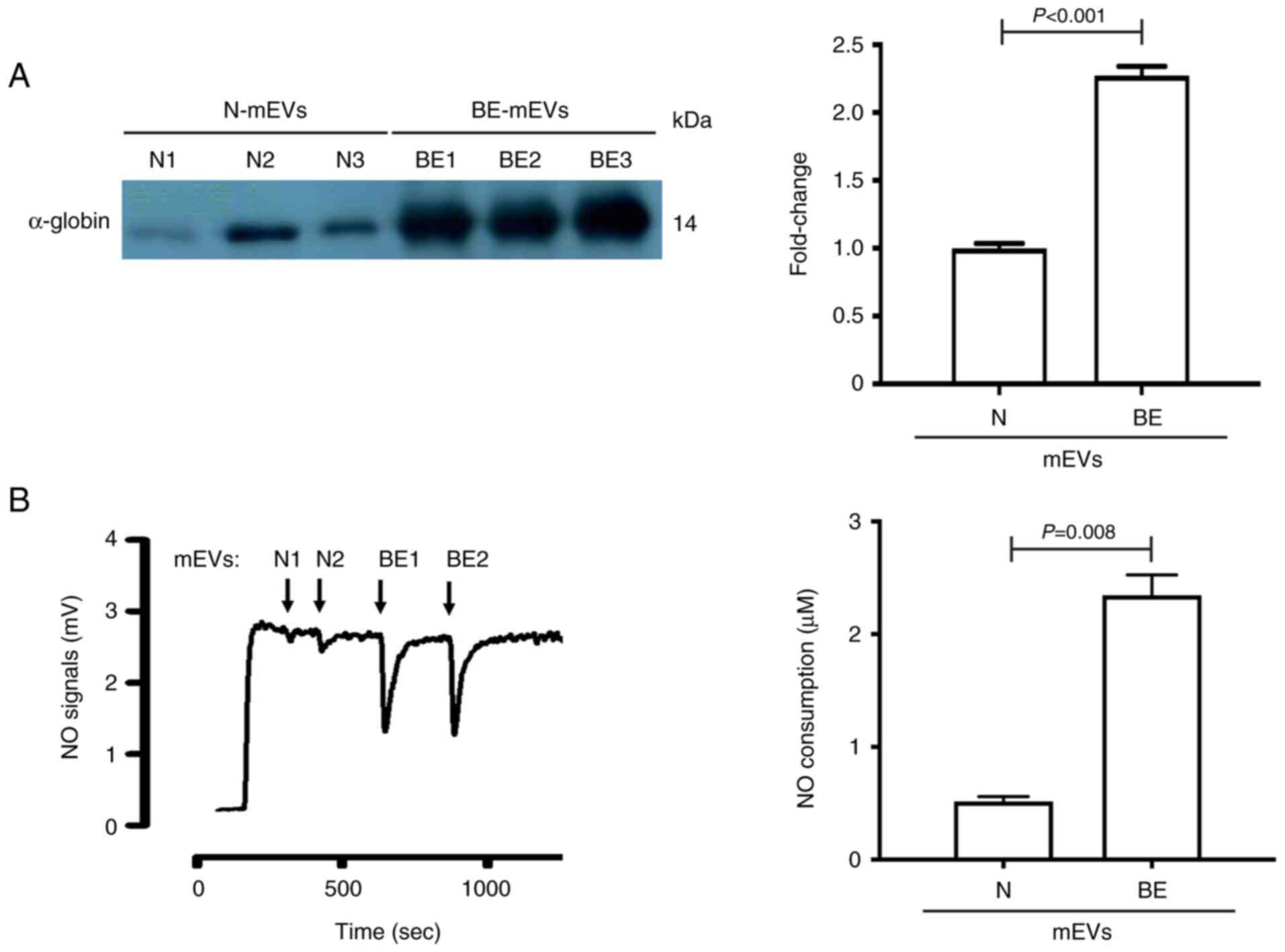|
1
|
Taher AT, Otrock ZK, Uthman I and
Cappellini MD: Thalassemia and hypercoagulability. Blood Rev.
22:283–292. 2008.PubMed/NCBI View Article : Google Scholar
|
|
2
|
Taher A, Isma'eel H, Mehio G, Bignamini D,
Kattamis A, Rachmilewitz EA and Cappellini MD: Prevalence of
thromboembolic events among 8,860 patients with thalassaemia major
and intermedia in the Mediterranean area and Iran. Thromb Haemost.
96:488–491. 2006.PubMed/NCBI
|
|
3
|
Butthep P, Bunyaratvej A, Funahara Y,
Kitaguchi H, Fucharoen S, Sato S and Bhamarapravati N: Alterations
in vascular endothelial cell-related plasma proteins in
thalassaemic patients and their correlation with clinical symptoms.
Thromb Haemost. 74:1045–1049. 1995.PubMed/NCBI
|
|
4
|
Butthep P, Bunyaratvej A, Funahara Y,
Kitaguchi H, Fucharoen S, Sato S and Bhamarapravati N: Possible
evidence of endothelial cell activation and disturbance in
thalassemia: An in vitro study. Southeast Asian J Trop Med Public
Health. 28 (Suppl 3):S141–148A. 1997.PubMed/NCBI
|
|
5
|
Vinchi F, Sparla R, Passos ST, Sharma R,
Vance SZ, Zreid HS, Juaidi H, Manwani D, Yazdanbakhsh K, Nandi V,
et al: Vasculo-toxic and pro-inflammatory action of unbound
haemoglobin, haem and iron in transfusion-dependent patients with
haemolytic anaemias. Br J Haematol. 193:637–658. 2021.PubMed/NCBI View Article : Google Scholar
|
|
6
|
Satitthummanid S, Uaprasert N, Songmuang
SB, Rojnuckarin P, Tosukhowong P, Sutcharitchan P and Srimahachota
S: Depleted nitric oxide and prostaglandin E2 levels are
correlated with endothelial dysfunction in β-thalassemia/HbE
patients. Int J Hematol. 106:366–374. 2017.PubMed/NCBI View Article : Google Scholar
|
|
7
|
Phongpao K, Pholngam N, Chokchaichamnankit
D, Nuamsee K, Praneetponkang R, Ounjai P, Paiboonsukwong K,
Siwaponanan P, Pattanapanyasat K, Svasti J, et al: Proteomic
profiling of circulating β-thalassaemia/haemoglobin E
extra-cellular vesicles reveals that association with
immunoglobulin induces membrane vesiculation. Br J Haematol.
204:2025–2039. 2024.PubMed/NCBI View Article : Google Scholar
|
|
8
|
Pattanapanyasat K, Gonwong S, Chaichompoo
P, Noulsri E, Lerdwana S, Sukapirom K, Siritanaratkul N and
Fucharoen S: Activated platelet-derived microparticles in
thalassaemia. Br J Haematol. 136:462–471. 2007.PubMed/NCBI View Article : Google Scholar
|
|
9
|
Kheansaard W, Phongpao K, Paiboonsukwong
K, Pattanapanyasat K, Chaichompoo P and Svasti S: Microparticles
from β-thalassaemia/HbE patients induce endothelial cell
dysfunction. Sci Rep. 8(13033)2018.PubMed/NCBI View Article : Google Scholar
|
|
10
|
Kato GJ and Taylor JG VI: Pleiotropic
effects of intravascular haemolysis on vascular homeostasis. Br J
Haematol. 148:690–701. 2010.PubMed/NCBI View Article : Google Scholar
|
|
11
|
Chaichompoo P, Kumya P, Khowawisetsut L,
Chiangjong W, Chaiyarit S, Pongsakul N, Sirithanaratanakul N,
Fucharoen S, Thongboonkerd V and Pattanapanyasat K:
Characterizations and proteome analysis of platelet-free
plasma-derived microparticles in β-thalassemia/hemoglobin E
patients. J Proteomics. 76 Spec No.:239–250. 2012.PubMed/NCBI View Article : Google Scholar
|
|
12
|
Théry C, Witwer KW, Aikawa E, Alcaraz MJ,
Anderson JD, Andriantsitohaina R, Antoniou A, Arab T, Archer F,
Atkin-Smith GK, et al: Minimal information for studies of
extracellular vesicles 2018 (MISEV2018): A position statement of
the international society for extracellular vesicles and update of
the MISEV2014 guidelines. J Extracell Vesicles.
7(1535750)2018.PubMed/NCBI View Article : Google Scholar
|
|
13
|
Welsh JA, Van Der Pol E, Arkesteijn GJA,
Bremer M, Brisson A, Coumans F, Dignat-George F, Duggan E, Ghiran
I, Giebel B, et al: MIFlowCyt-EV: A framework for standardized
reporting of extracellular vesicle flow cytometry experiments. J
Extracell Vesicles. 9(1713526)2020.PubMed/NCBI View Article : Google Scholar
|
|
14
|
Feliers D, Chen X, Akis N, Choudhury GG,
Madaio M and Kasinath BS: VEGF regulation of endothelial nitric
oxide synthase in glomerular endothelial cells. Kidney Int.
68:1648–1659. 2005.PubMed/NCBI View Article : Google Scholar
|
|
15
|
Suvachananonda T, Wankham A, Srihirun S,
Tanratana P, Unchern S, Fucharoen S, Chuansumrit A, Sirachainan N
and Sibmooh N: Decreased nitrite levels in erythrocytes of children
with β-thalassemia/hemoglobin E. Nitric Oxide. 33:1–5.
2013.PubMed/NCBI View Article : Google Scholar
|
|
16
|
Förstermann U and Sessa WC: Nitric oxide
synthases: Regulation and function. Eur Heart J. 33:829–837,
837a-837d. 2012.PubMed/NCBI View Article : Google Scholar
|
|
17
|
Donadee C, Raat NJ, Kanias T, Tejero J,
Lee JS, Kelley EE, Zhao X, Liu C, Reynolds H, Azarov I, et al:
Nitric oxide scavenging by red blood cell microparticles and
cell-free hemoglobin as a mechanism for the red cell storage
lesion. Circulation. 124:465–476. 2011.PubMed/NCBI View Article : Google Scholar
|
|
18
|
Brewster LM, Bain AR, Garcia VP, Fandl HK,
Stone R, DeSouza NM, Greiner JJ, Tymko MM, Vizcardo-Galindo GA,
Figueroa-Mujica RJ, et al: Global REACH 2018: Dysfunctional
extracellular microvesicles in Andean highlander males with
excessive erythrocytosis. Am J Physiol Heart Circ Physiol.
320:H1851–H1861. 2021.PubMed/NCBI View Article : Google Scholar
|
|
19
|
Brewster LM, Coombs GB, Garcia VP, Hijmans
JG, DeSouza NM, Stockelman KA, Barak OF, Mijacika T, Dujic Z,
Greiner JJ, et al: Effects of circulating extracellular
microvesicles from spinal cord-injured adults on endothelial cell
function. Clin Sci (Lond). 134:777–789. 2020.PubMed/NCBI View Article : Google Scholar
|
|
20
|
Yingchoncharoen T, Rakyhao T, Chuncharunee
S, Sritara P, Pienvichit P, Paiboonsukwong K, Sathavorasmith P,
Sirirat K, Sriwantana T, Srihirun S and Sibmooh N: Inhaled
nebulized sodium nitrite decreases pulmonary artery pressure in
β-thalassemia patients with pulmonary hypertension. Nitric Oxide.
76:174–178. 2018.PubMed/NCBI View Article : Google Scholar
|
|
21
|
Sasiprapha T, Pussadhamma B, Sibmooh N,
Sriwantana T, Pienvichit P, Chuncharunee S and Yingchoncharoen T:
Efficacy and safety of inhaled nitrite in addition to sildenafil in
thalassemia patients with pulmonary hypertension: A 12-week
randomized, double-blind placebo-controlled clinical trial. Nitric
Oxide. 120:38–43. 2022.PubMed/NCBI View Article : Google Scholar
|
|
22
|
Kukongviriyapan V, Somparn N, Senggunprai
L, Prawan A, Kukongviriyapan U and Jetsrisuparb A: Endothelial
dysfunction and oxidant status in pediatric patients with
hemoglobin E-beta thalassemia. Pediatr Cardiol. 29:130–135.
2008.PubMed/NCBI View Article : Google Scholar
|
|
23
|
Aggeli C, Antoniades C, Cosma C,
Chrysohoou C, Tousoulis D, Ladis V, Karageorga M, Pitsavos C and
Stefanadis C: Endothelial dysfunction and inflammatory process in
transfusion-dependent patients with beta-thalassemia major. Int J
Cardiol. 105:80–84. 2005.PubMed/NCBI View Article : Google Scholar
|
|
24
|
Siriworadetkun S, Thubthed R, Thiengtavor
C, Paiboonsukwong K, Khuhapinant A, Fucharoen S, Pattanapanyasat K,
Vadolas J, Svasti S and Chaichompoo P: Elevated levels of
circulating monocytic myeloid derived suppressor cells in
splenectomised β-thalassaemia/HbE patients. Br J Haematol.
191:e72–e76. 2020.PubMed/NCBI View Article : Google Scholar
|
|
25
|
Tantawy AA, Adly AA, Ismail EA and Habeeb
NM: Flow cytometric assessment of circulating platelet and
erythrocytes microparticles in young thalassemia major patients:
Relation to pulmonary hypertension and aortic wall stiffness. Eur J
Haematol. 90:508–518. 2013.PubMed/NCBI View Article : Google Scholar
|
|
26
|
Carciero L, Di Giuseppe G, Di Piazza E,
Parand E, Soldovieri L, Ciccarelli G, Brunetti M, Gasbarrini A,
Nista EC, Pani G, et al: The interplay of extracellular vesicles in
the pathogenesis of metabolic impairment and type 2 diabetes.
Diabetes Res Clin Pract. 216(111837)2024.PubMed/NCBI View Article : Google Scholar
|
|
27
|
Athira AP, Sreekanth S, Chandran A and
Lahon A: Dual role of extracellular vesicles as orchestrators of
emerging and reemerging virus infections. Cell Biochem Biophys: Sep
3, 2024 (Epub ahead of print).
|
|
28
|
Li L, Li F, Bai X, Jia H, Wang C, Li P,
Zhang Q, Guan S, Peng R, Zhang S, et al: Circulating extracellular
vesicles from patients with traumatic brain injury induce
cerebrovascular endothelial dysfunction. Pharmacol Res.
192(106791)2023.PubMed/NCBI View Article : Google Scholar
|
|
29
|
An R, Man Y, Cheng K, Zhang T, Chen C,
Wang F, Abdulla F, Kucukal E, Wulftange WJ, Goreke U, et al: Sickle
red blood cell-derived extracellular vesicles activate endothelial
cells and enhance sickle red cell adhesion mediated by von
Willebrand factor. Br J Haematol. 201:552–563. 2023.PubMed/NCBI View Article : Google Scholar
|
|
30
|
Atipimonpat A, Siwaponanan P, Khuhapinant
A, Svasti S, Sukapirom K, Khowawisetsut L and Pattanapanyasat K:
Extracellular vesicles from thalassemia patients carry
iron-containing ferritin and hemichrome that promote cardiac cell
proliferation. Ann Hematol. 100:1929–1946. 2021.PubMed/NCBI View Article : Google Scholar
|
|
31
|
Klaihmon P, Phongpao K, Kheansaard W,
Noulsri E, Khuhapinant A, Fucharoen S, Morales NP, Svasti S,
Pattanapanyasat K and Chaichompoo P: Microparticles from
splenectomized β-thalassemia/HbE patients play roles on
procoagulant activities with thrombotic potential. Ann Hematol.
96:189–198. 2017.PubMed/NCBI View Article : Google Scholar
|
















